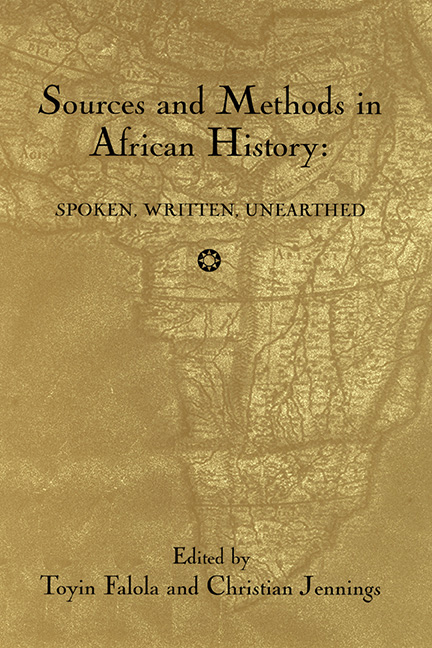Book contents
- Frontmatter
- Dedication
- Contents
- Acknowledgments
- Introduction
- Part I Archaeological Sources
- Part II Africa and the Atlantic World
- 6 Section Introduction: Methodology through the Ethnic Lens: The Study of Atlantic Africa
- 7 Pathways to African Ethnicity in the Americas: African National Associations in Cuba during Slavery
- 8 Slave Trade Nomenclature and African Ethnicities in the Americas: Evidence from Early Eighteenth-Century Costa Rica
- 9 Africa in Louisiana: In Search of “Bambara” and Creole Identities in Literary and Statistical Sources
- Part III Documentary Sources
- Part IV Oral Tradition
- Part V Innovative Sources and Methods
- Contributors
- Index
7 - Pathways to African Ethnicity in the Americas: African National Associations in Cuba during Slavery
from Part II - Africa and the Atlantic World
Published online by Cambridge University Press: 25 October 2017
- Frontmatter
- Dedication
- Contents
- Acknowledgments
- Introduction
- Part I Archaeological Sources
- Part II Africa and the Atlantic World
- 6 Section Introduction: Methodology through the Ethnic Lens: The Study of Atlantic Africa
- 7 Pathways to African Ethnicity in the Americas: African National Associations in Cuba during Slavery
- 8 Slave Trade Nomenclature and African Ethnicities in the Americas: Evidence from Early Eighteenth-Century Costa Rica
- 9 Africa in Louisiana: In Search of “Bambara” and Creole Identities in Literary and Statistical Sources
- Part III Documentary Sources
- Part IV Oral Tradition
- Part V Innovative Sources and Methods
- Contributors
- Index
Summary
The Atlantic slave trade and its legacy represents one of the strongest currents that shaped and continues to influence identities in the Americas. The largest forced migration in human history uprooted more than ten million Africans from their home communities and scattered them throughout the Americas. Although ownership of human beings in one form or another had been a feature common to most societies of the world until about 1800, the racial component of slavery in the Americas, whereby people of white European ancestry owned people of black African ancestry, made the institution distinct from its Old World precedents. As a result, over time, the identification as black or white often defined the boundaries that separated slave and free, rich and poor, employer and employee, and ruler and subject. In this chapter, I shift the attention away from racial identities shaped by New World slavery to examine how Africans identified themselves in their new Cuban surroundings. Africans recognized that a white ruling class of European ancestry governed Cuban society and that all people of the African diaspora shared a common association with racial oppression. However, Africans did not define themselves only in racialized terms of European derivation.
Africans in Cuba voluntarily formed associations based upon a common ethnicity that often reflected a shared geographic origin, language, and common culture. Prevalent in colonial society, these collective organizations became known as cabildos de nación to reflect the voluntary grouping by common ethnic identity of the numerous African “nations” forcibly imported to Cuba. The Spanish term cabildo represents the English language equivalent of a town council or a town government. Consequently, the labeling of these societies as cabildos provides some indication of how they functioned as representative bodies for African nations by providing political, administrative, social, and cultural services. Almost all the activities of the cabildos revolved around the ownership of a home that served numerous functions vital to the society: a boarding-house which rented rooms; a conference center for holding meetings and reunions; a school for education and training in the artisan trades; a bank by collecting membership dues, offering loans, and even purchasing the freedom for slaves; a restaurant through food services such as the “plate of the day”; a theater for dances; and even a funeral parlor. The cabildo house provided a sacred space for ethnic solidarity in a society increasingly divided along racial lines between slavery and freedom.
- Type
- Chapter
- Information
- Sources and Methods in African HistorySpoken Written Unearthed, pp. 118 - 144Publisher: Boydell & BrewerPrint publication year: 2003



